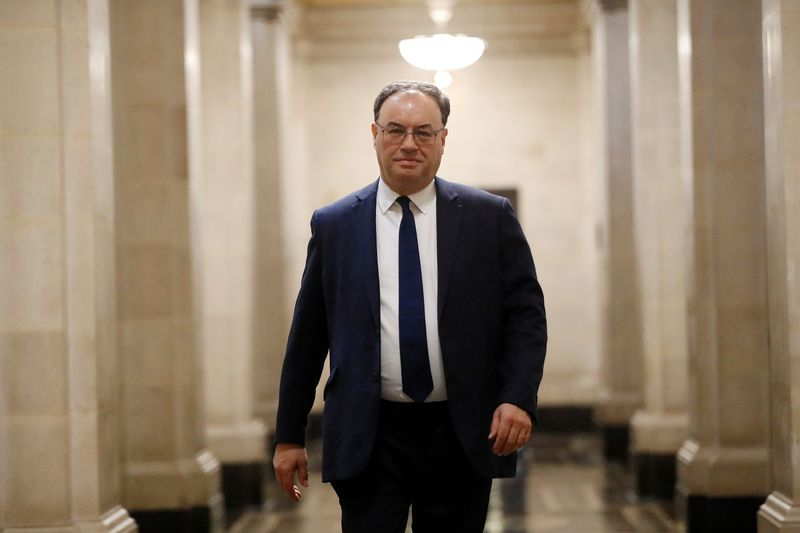Bank of England preview – What can we expect? By Investing.com

By Samuel Indyk
Investing.com – The Bank of England (BoE) will announce its latest monetary policy decision on Thursday and also publish its latest quarterly monetary policy report (previously named the inflation report). Expectation is for the central bank to keep its interest rate on hold at a record low of 0.1%, the level the rate was cut to when the pandemic started wreaking havoc on the UK economy in March. It is expected that all nine members of the Monetary Policy Committee (MPC) will vote to keep the interest rate unchanged. The QE programme is also expected to remain unchanged at a total of £875B.
Improving economy?
The UK economy has gone into reverse during the latter part of Q4 2020 and early 2021. Strict national lockdowns could well see the UK enter a double-dip recession with a number of UK sectors suffering from restrictions. IHS Markit’s January services PMI confirmed the economy could shrink in Q1. “January data pointed to a steep and accelerated fall in UK service sector output, with the rate of decline the fastest recorded since May 2020,” the consultancy said. “Survey respondents overwhelmingly linked lower activity to the impact of restrictions on trade and temporary business closures during the third national lockdown.”
Unsurprisingly, the lower levels of service sector activity were linked to the lockdown and a decline in output among travel & leisure and hospitality industries. However, things may be looking up. Respondents to the survey were at their most optimistic about future growth since 2013, with 60% of the panel anticipating a rise inactivity over the next 12 months. The main reason cited was the pandemic trajectory with swift progress for the UK vaccine rollout providing hopes of a timely return to growth. However, much of this could depend on the efficacy of the vaccines against the new variants of the coronavirus.
The Committee will have to judge whether the most recent hit to the economy could end up manifesting itself as a long-term problem, or whether it will be short-lived, and the pent-up demand begins to take hold in the second half of the year.
Spring Budget
Another argument for staying on the sideline at this meeting is that – in less than a month’s time – the UK Chancellor Rishi Sunak is expected to announce the latest UK budget. “The MPC may want to hear what Chancellor Sunak has to say about fiscal policy in his 3 March Budget speech, and in particular, whether the furlough scheme will be extended beyond the end of April before deciding on further action,” writes Lloyds) Bank in a research note. “They may also feel that further stimulus may have little impact while much of the economy is still in lockdown.”
There has been various leaks and rumours about what Sunak may or may not do in his budget on March 3rd. The furlough scheme is scheduled to run until April and an extension of that might be the first thing that people will be hoping for. Separately, it has been touted that Sunak could raise corporation tax and scrap the freeze on fuel duty as the UK attempts to lower the ballooning the deficit, in part caused by the pandemic. It was suggested over the weekend that the Chancellor would likely make no changes to VAT, national insurance, and income tax.
Negative Rates?
One question on everybody’s lips is could the Bank of England cut interest rates into negative territory? The answer to that could well determine how markets react to the decision. Over the weekend it was reported that the BoE is expected to reveal its view on whether negative interest rates should be part of its armoury if the economy were to require more stimulus. We know that some members are in favour of negative rates, most notable Silvana Tenreyro. But the Governor Andrew Bailey appears more cautious. “In simple economics and maths terms, there is nothing to stop it at all,” Bailey said on January 12th, “However there are a lot of issues with it.”
Bank of America) expects the talk about negative rates to have most impact on the FX market. “The debate around negative rates is likely to prove the most significant for GBP given the pound’s historic sensitivity to rate differentials,” BofA analysts said in a research note.
Analysts at Nomura say something similar and note that the monetary policy report should contain evidence gathered from banks about whether negative rates are operationally feasible. They expect the central bank to confirm that negative rates “should be included in the MPC’s toolkit” but don’t expect the policy to be triggered this time.
Brexit
One cloud that may have been lifted is the prospect of a no-deal Brexit. At the tail end of last year, UK and EU negotiators agreed a trade deal, ending years of speculation about the future trading arrangement between the two parties. However, it has not all been rosy. There have been teething problems at ports in the UK while threats to staff at ports in Northern Ireland have led to a suspension of checks on goods. The BoE will have to decide whether the latest trade deal will provide a medium to long term hit to the economy or whether the UK’s ability to make trade deals independently could mean the hit is negated.

